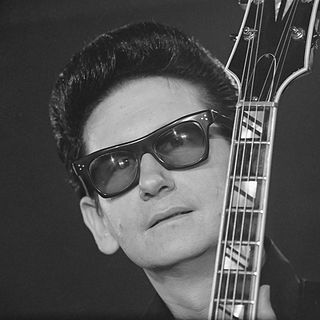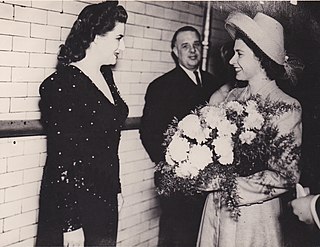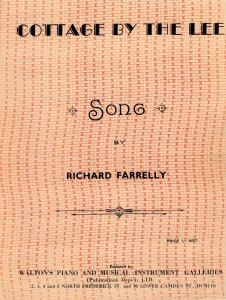
Roy Kelton Orbison was an American singer, songwriter, and musician known for his impassioned singing style, complex song structures, and dark, emotional ballads. His music was described by critics as operatic, earning him the nicknames "The Caruso of Rock" and "The Big O." Many of Orbison's songs conveyed vulnerability at a time when most male rock-and-roll performers chose to project masculinity. He performed while standing motionless and wearing black clothes to match his dyed black hair and dark sunglasses, which he wore to counter his shyness and stage fright.

The Quiet Man is a 1952 American romantic comedy-drama film directed by John Ford. It stars John Wayne, Maureen O'Hara, Barry Fitzgerald, Ward Bond and Victor McLaglen. The screenplay by Frank S. Nugent was based on a 1933 Saturday Evening Post short story of the same name by Maurice Walsh, later published as part of a collection titled The Green Rushes. The film is notable for Winton Hoch's lush photography of the Irish countryside and a long, climactic, semi-comic fist fight. It was an official selection of the 1952 Venice Film Festival.

John Francis Burke was an American lyricist, successful and prolific between the 1920s and 1950s. His work is considered part of the Great American Songbook.

David Thomas Mason is an English singer-songwriter and guitarist from Worcester, who first found fame with the rock band Traffic. Over the course of his career, Mason has played and recorded with many notable pop and rock musicians, including Paul McCartney, George Harrison, the Rolling Stones, Jimi Hendrix, Eric Clapton, Michael Jackson, David Crosby, Graham Nash, Steve Winwood, Fleetwood Mac, Delaney & Bonnie, Leon Russell, and Cass Elliot. One of Mason's best known songs is "Feelin' Alright", recorded by Traffic in 1968 and later by many other performers, including Joe Cocker, whose version of the song was a hit in 1969. For Traffic, he also wrote "Hole in My Shoe", a psychedelic pop song that became a hit in its own right. "We Just Disagree", Mason's 1977 solo U.S. hit, written by Jim Krueger, has become a staple of U.S. classic hits and adult contemporary radio playlists.
Gordon Hill Jenkins was an American arranger, composer, and pianist who was influential in popular music in the 1940s and 1950s. Jenkins worked with The Andrews Sisters, Johnny Cash, The Weavers, Frank Sinatra, Louis Armstrong, Judy Garland, Nat King Cole, Billie Holiday, Harry Nilsson, Peggy Lee and Ella Fitzgerald.

John Charles Barrett, known professionally as Desmond Child, is an American songwriter and producer. He was inducted into the Songwriters Hall of Fame in 2008. He is the son of Joseph Marfy and of songwriter Elena Casals.

Richard Benjamin Haymes was an Argentinian-Irish actor and singer. He was one of the most popular male vocalists of the 1940s and early 1950s. He was the older brother of Bob Haymes, an actor, television host, and songwriter.

Victor Edward Willis is an American singer, songwriter, and actor. He is the founding member of the disco group Village People. He performed as their lead singer and was co-songwriter for all of their most successful singles. In the group, he performed costumed as a policeman or a naval officer.
Al Hoffman was an American song composer. He was a hit songwriter active in the 1930s, 1940s and 1950s, usually co-writing with others and responsible for number-one hits through each decade, many of which are still sung and recorded today. He was posthumously made a member of the Songwriters Hall of Fame in 1984. The popularity of Hoffman's song, "Mairzy Doats", co-written with Jerry Livingston and Milton Drake, was such that newspapers and magazines wrote about the craze. Time magazine titled one article "Our Mairzy Dotage". The New York Times simply wrote the headline, "That Song".

Anne Shelton was a popular English vocalist, who is remembered for providing inspirational songs for soldiers both on radio broadcasts, and in person, at British military bases during the Second World War. During the 1950s and 60s, Shelton had some success on the UK Singles Chart, topping it in 1956 with "Lay Down Your Arms".
Gerard W. Kenny is an American singer-songwriter, based in London, England. In 1981, he received the Ivor Novello Award for Best Television Theme Music for his song "I Could Be So Good for You", the theme tune of the ITV series Minder.

"United We Stand" is a song written by Tony Hiller and Peter Simons. It was first released in 1970 by The Brotherhood of Man, becoming the band's first hit, peaking at #13 in the U.S., #9 in Canada, and #10 in the U.K. The song spent 15 weeks on the charts, and is ranked as the 64th biggest U.S. hit of 1970. It also reached #8 in Australia.
Annaghdown is a civil parish in County Galway, Ireland. It takes its name from Eanach Dhúin, Irish for "the marsh of the fort". It lies around Annaghdown Bay, an inlet of Lough Corrib. Villages in the civil parish include Corrandulla and Currandrum. Annaghdown is also an ecclesiastical parish in the Roman Catholic Archdiocese of Tuam and the Church of Ireland Diocese of Tuam, Killala and Achonry.

Richard Farrelly was an Irish songwriter, policeman and poet, composer of "The Isle of Innisfree", the song for which he is best remembered. His parents were publicans and when Farrelly was twenty-three he left Kells, County Meath for Dublin to join the Irish Police Force. He served in various Garda stations throughout his thirty-eight-year career, ending up in the Carriage Office in Dublin Castle. At heart Farrelly was very much a songwriter and poet. He was a private, modest and shy man who wrote over two hundred songs and poems during his lifetime. He married Anne Lowry from Headford, Co.Galway in 1955 and the couple had five children. His two sons Dick and Gerard are professional musicians.

The "Isle of Innisfree" is a song composed by Dick Farrelly, who wrote both the music and lyrics. Farrelly got the inspiration for "Isle of Innisfree", the song for which he is best remembered, while on a bus journey from his native Kells, County Meath to Dublin. The song was published in 1950 by the Peter Maurice Music Publishing Co.
We Dreamed our Dreams is a song written by Irish songwriter Dick Farrelly. Dick is best known for his song, "Isle of Innisfree" theme of the film, The Quiet Man. "We Dreamed our Dreams" was first recorded by, The Fureys & Davey Arthur on their album, "The Scattering" released in 1988 on the Harmac Record Label.

"Cottage by the Lee" is a song written by Irish songwriter Dick Farrelly. It was composed in the early 1950s and is published by Waltons Music Publishing in Dublin, Ireland.

Legacy of a Quiet Man is a music album by Irish singer Sinead Stone and musician Gerard Farrelly. The album was released in 2001 on the Seolta Records label and is a collection of songs written by Gerard’s father Dick Farrelly. Dick is best remembered for his composition, The Isle of Innisfree which became a worldwide hit for Bing Crosby and was used as the theme music of the film, The Quiet Man, starring John Wayne and Maureen O'Hara.
Jules Leonard "Buddy" Kaye was an American songwriter, producer, and author. His songs were recorded by top performers, including Frank Sinatra, Bob Dylan, Sarah Vaughan, Dinah Washington, Ella Fitzgerald, McGuire Sisters, Glenn Miller, Sammy Kaye, Perry Como, Elvis Presley, Charles Aznavour, Tony Bennett, Cliff Richard, Pat Boone, Harry Belafonte, Bobby Darin, Little Richard, Barry Manilow, Karen Carpenter, Diana Krall, and Dusty Springfield. He scored number-one hits on the Billboard charts in 1945 with "Till The End Of Time", recorded by Perry Como, and in 1949 with "'A' You're Adorable ", recorded by Como and the Fontaine Sisters. Among his most recognizable tunes in pop culture are the theme songs to the Famous Studios theatrical cartoons Little Lulu and Little Audrey; the international hit song "Speedy Gonzales", recorded by Pat Boone; and the co-written theme song to the television series I Dream of Jeannie. In 1976, he won a Grammy Award for best children's album for his production of The Little Prince, narrated by Richard Burton.












